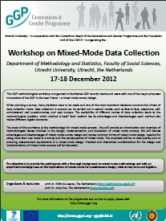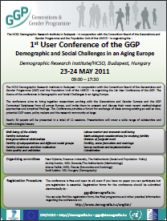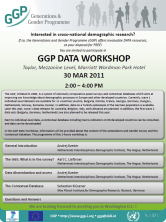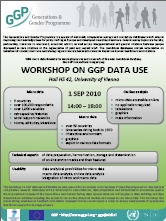 This GGP methodological workshop is organized to familiarize the GGP country teams and users with the lessons learnt in the GGP re-design study (2009-2012). During the period of last four years a decade of GGP experiences have been evaluated and necessary enhancements proposed in order to prepare the GGP as a sustainable research infrastructure of the decades to come. The workshop will introduce one of the major proposed innovations of the GGP in the new future – a mixed mode survey design.
This GGP methodological workshop is organized to familiarize the GGP country teams and users with the lessons learnt in the GGP re-design study (2009-2012). During the period of last four years a decade of GGP experiences have been evaluated and necessary enhancements proposed in order to prepare the GGP as a sustainable research infrastructure of the decades to come. The workshop will introduce one of the major proposed innovations of the GGP in the new future – a mixed mode survey design.
When planning a survey, many decisions have to be made and one of the most important decisions concerns the choice of data collection mode. Data collection in surveys can be carried out in several modes, such as face-to-face, telephone, self-administered mail questionnaires, and web surveys. The availability of different modes of data collection leads to the methodological question: which method is best? Each method has its advantages and disadvantages; each method also makes different logistic demands. Sometimes the choice for a particular data collection is easy and straightforward. But often the situation is more complex and one single method will not suffice. Therefore multiple modes of data collection or mixed modes have become more and more popular in survey practice. Recommendations for the future implementations of the GGP also call for the use of multiple modes of data collection in order to reduce the cost of data collection, while retaining the high level of data quality.
The topic of this workshop is the methodology for mixed-mode surveys. We will provide an introduction and overview of methodological issues involved in the design, implementation, and evaluation of mixed mode surveys. We will discuss advantages and disadvantages of mixed-mode survey design and review common forms of mixed-mode design, reasons for using more than one mode in a survey and the consequences of mixed-mode. The emphasis will be on data quality and on ensuring measurement equivalence in a mixed-mode design. Practical and theoretical considerations for the design and implementation of mixed-mode surveys will be discussed, we will not focus on the ICT aspects of mixed-mode design (software, programming) nor on the statistical models for adjustment, although general principles of adjustment will be reviewed.
The objective is to provide the participants with a thorough background on mixed mode methodology and with an empirical knowledge base on the implications of mixed-mode for questionnaire design, total survey error and logistics. A text on mixed-mode design and a power-point handout will be available for all participants.
The organizers and principal lecturers are prof. dr. Edith de Leeuw and prof. dr. Joop Hox.
Participation is free of charge. Priority will be given to the representatives of the GGP National teams (members of the NNFP). Participants are expected to cover their own travel and accommodation costs.
To apply, please write an e-mail to: ggp@nidi.nl
Download documents:
 This GGP methodological workshop is organized to familiarize the GGP country teams and users with the lessons learnt in the GGP re-design study (2009-2012). During the period of last four years a decade of GGP experiences have been evaluated and necessary enhancements proposed in order to prepare the GGP as a sustainable research infrastructure of the decades to come. The workshop will introduce one of the major proposed innovations of the GGP in the new future – a mixed mode survey design.
This GGP methodological workshop is organized to familiarize the GGP country teams and users with the lessons learnt in the GGP re-design study (2009-2012). During the period of last four years a decade of GGP experiences have been evaluated and necessary enhancements proposed in order to prepare the GGP as a sustainable research infrastructure of the decades to come. The workshop will introduce one of the major proposed innovations of the GGP in the new future – a mixed mode survey design.
When planning a survey, many decisions have to be made and one of the most important decisions concerns the choice of data collection mode. Data collection in surveys can be carried out in several modes, such as face-to-face, telephone, self-administered mail questionnaires, and web surveys. The availability of different modes of data collection leads to the methodological question: which method is best? Each method has its advantages and disadvantages; each method also makes different logistic demands. Sometimes the choice for a particular data collection is easy and straightforward. But often the situation is more complex and one single method will not suffice. Therefore multiple modes of data collection or mixed modes have become more and more popular in survey practice. Recommendations for the future implementations of the GGP also call for the use of multiple modes of data collection in order to reduce the cost of data collection, while retaining the high level of data quality.
The topic of this workshop is the methodology for mixed-mode surveys. We will provide an introduction and overview of methodological issues involved in the design, implementation, and evaluation of mixed mode surveys. We will discuss advantages and disadvantages of mixed-mode survey design and review common forms of mixed-mode design, reasons for using more than one mode in a survey and the consequences of mixed-mode. The emphasis will be on data quality and on ensuring measurement equivalence in a mixed-mode design. Practical and theoretical considerations for the design and implementation of mixed-mode surveys will be discussed, we will not focus on the ICT aspects of mixed-mode design (software, programming) nor on the statistical models for adjustment, although general principles of adjustment will be reviewed.
The objective is to provide the participants with a thorough background on mixed mode methodology and with an empirical knowledge base on the implications of mixed-mode for questionnaire design, total survey error and logistics. A text on mixed-mode design and a power-point handout will be available for all participants.
The organizers and principal lecturers are prof. dr. Edith de Leeuw and prof. dr. Joop Hox.
Participation is free of charge. Priority will be given to the representatives of the GGP National teams (members of the NNFP). Participants are expected to cover their own travel and accommodation costs.
To apply, please write an e-mail to: ggp@nidi.nl
Download documents:
The HCSO Demographic Research Institute in Budapest – in cooperation with the Consortium Board of the Generations and Gender Programme and the Population Unit of the UNECE – is organizing the 1st User Conference of the GGP: Demographic and Social Challenges in an Aging Europe.
 The conference aims to bring together researchers working with the Generations and Gender Surveys and the GGP Contextual Databases from all across Europe, and invite them to present and discuss their most recent methodological approaches and empirical findings. The Conference provides a forum for exchange of ideas among existing as well as new, potential GGP users, policy makers and the research community at large.
The conference aims to bring together researchers working with the Generations and Gender Surveys and the GGP Contextual Databases from all across Europe, and invite them to present and discuss their most recent methodological approaches and empirical findings. The Conference provides a forum for exchange of ideas among existing as well as new, potential GGP users, policy makers and the research community at large.
Nearly 50 papers will be presented in a total of 12 sessions. Presentations will cover a wide range of substantive and methodological issues: The HCSO Demographic Research Institute in Budapest – in cooperation with the Consortium Board of the Generations and Gender Programme (GGP) and the Population Unit of the UNECE – is organizing the 1st User Conference of the GGP. The theme of the conference is Demographic and Social Challenges in an Aging Europe. The conference aims to bring together researchers working with the Generations and Gender Surveys and the GGP Contextual Databases from all across Europe, and invite them to present and discuss their most recent methodological approaches and empirical findings. The Conference provides a forum for exchange of ideas among existing as well as new, potential GGP users, policy makers and the research community at large.
Nearly 50 papers will be presented in a total of 12 sessions. Presentations will cover a wide range of substantive and methodological issues:
Well-being of the elderly, Fertility behaviour, Intergenerational relationships, Fertility of subpopulations and different social groups, Fertility intentions and their realization, Data quality and validation, Labour market and economic well-being, Methodological considerations for studying fertility, Division of (un)paid work, Fertility, union formation and marriage, Survey methods and implementation, Cohabitation
Organizing committee:
Pearl Dykstra, Erasmus University, The Netherlands (Social and Population Policy)
Andrej Kveder, NIDI, Slovenia/The Netherlands (Methodology)
Ariane Pailhé, INED, France (Economics and Sociology)
Zsolt Spéder, DRI, Hungary (Demography)
You can also find the final programme and other practical information regarding the conference here.
Download documents:
Interested in cross-national demographic research? If so, the Generations and Gender Programme (GGP) offers invaluable data resources, at your disposal for free!
 The GGP, initiated in 2000, is a system of nationally comparative panel surveys and contextual databases which aims at improving our knowledge about demographic processes in Europe and other developed countries. Currently, wave 1 individual-level datasets are available for 11 countries (Austria, Bulgaria, Estonia, France, Georgia, Germany, Hungary, Netherlands, Norway, Rumania, Russia). In addition, data on a Turkish-subsample of the German population is available. Later this year, wave 1 data releases for Australia, Belgium, Italy, and Lithuania are planned. In addition, the first wave 2 data sets (Bulgaria, Germany, Netherlands) are also planned to be released this year.
The GGP, initiated in 2000, is a system of nationally comparative panel surveys and contextual databases which aims at improving our knowledge about demographic processes in Europe and other developed countries. Currently, wave 1 individual-level datasets are available for 11 countries (Austria, Bulgaria, Estonia, France, Georgia, Germany, Hungary, Netherlands, Norway, Rumania, Russia). In addition, data on a Turkish-subsample of the German population is available. Later this year, wave 1 data releases for Australia, Belgium, Italy, and Lithuania are planned. In addition, the first wave 2 data sets (Bulgaria, Germany, Netherlands) are also planned to be released this year.
Next to individual-level data, a contextual database including macro-indicators on 60 developed countries can be consulted, and data can be downloaded.
In the GGP Data Workshop, information will be provided about the content of the Generations and Gender Survey and the Contextual Database. The programme of this 2-hours workshop is:
We are looking forward to meeting you in Washington DC!
Download flyer:
With micro data available for international use and re-launch of the new contextual database, the GGP Consortium is organizing the Workshop on GGP Data Use as a side meeting at European Population Conference.
 This workshop on GGP data use will familiarise data users with the content and treatment of data files prepared for international comparative research. Attendees will be introduced to data collection, data preparation and harmonization procedures used in the international releases of the Generations and Gender Survey data. Special attention will be give to data archiving and data dissemination activities including the access to the on-line analytical module and access to the micro-data. The workshop also places strong emphasis on feedback information received from its current users in order to ensure development of procedures that fit the needs of wide range of users.
This workshop on GGP data use will familiarise data users with the content and treatment of data files prepared for international comparative research. Attendees will be introduced to data collection, data preparation and harmonization procedures used in the international releases of the Generations and Gender Survey data. Special attention will be give to data archiving and data dissemination activities including the access to the on-line analytical module and access to the micro-data. The workshop also places strong emphasis on feedback information received from its current users in order to ensure development of procedures that fit the needs of wide range of users.
Download flyer:
Fill the form below with your contact information to receive our monthly GGP at a glance newsletter.
